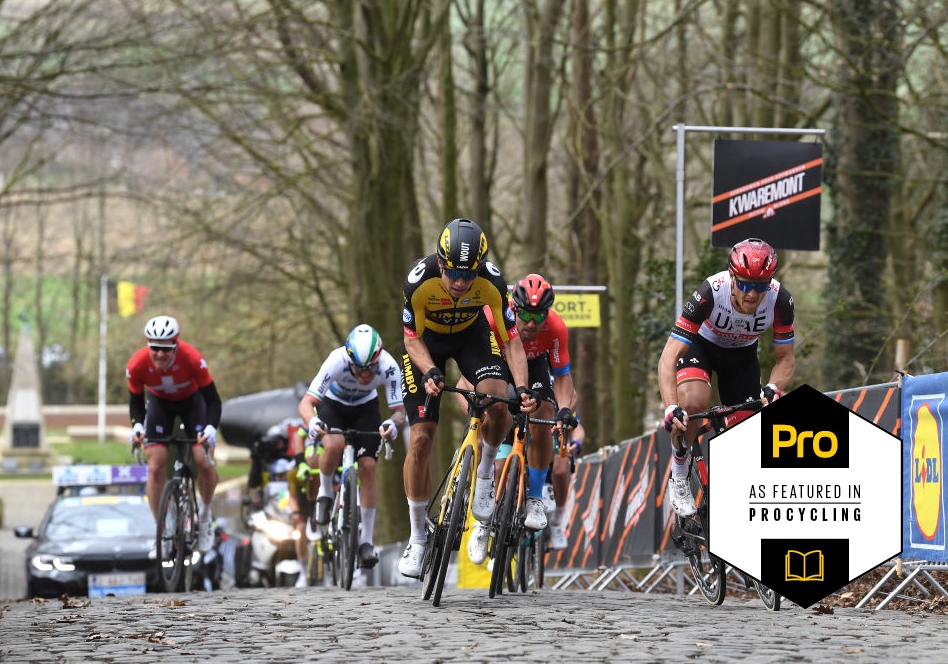Gent-Wevelgem continues run of Belgian Classics marked by relentless racing
The men's Gent-Wevelgem saw punishing action from far-out, echoing the E3 Saxo Bank Classic

Bike racing is brutal. With 33 kilometres to go at Sunday's Gent-Wevelgem, Deceuninck-QuickStep sprinter Sam Bennett was seen throwing up after the sheer amount of effort he’d made to be in the lead group.
Even in cycling, a sport where people are pushed to their limits, the sight of someone vomiting live on television is rare. But after five hours pushing himself, Bennett couldn’t remain with the front group any longer.
This wasn’t a race where the decisive action happened close to the finish, quite the opposite. Just 71 kilometres into the 247-kilometre race, 21 riders pushed off the front, splitting the peloton apart, including the eight who contested the finish.
That left 176 kilometres out in the front, ridden at a ridiculous pace. Despite the gap hovering around a minute, the leaders were never chased down again, illustrating how tough the day was.
The riders were pushed to breaking point by the brutality of the wind whipping across the flat landscape of west Flanders. The peloton had broken into echelons before the race had even made it onto television, meaning there was mystery in how the deciding push was made. By the time that the cameras were switched on, the morning break had vanished, and the group out front was already the winning move.
What this proves, other than that cycling is one of the few sports where part of the 'product' is hidden from those who want to watch it, is how early the race was on. Whether this was just down to the weather on Sunday, with teams taking advantage of the wind, we don’t know. However, it was the second Belgian classic in a row where the action happened far from the finish.
On Friday, at the E3 Saxo Bank Classic, Deceuninck-QuickStep ripped the race apart with a team time trial-like effort with into the bottom of the Taaienberg, 80 kilometres out. It looked like the Belgian squad were heeding the message of their manager, Patrick Lefevere, who had said the only way to beat Mathieu van der Poel and Wout van Aert was by isolating them with numbers.
Get The Leadout Newsletter
The latest race content, interviews, features, reviews and expert buying guides, direct to your inbox!
Perhaps this is evidence of the desperation of riders to perform well should the season be curtailed or cancelled again; Paris-Roubaix is looking in doubt already, and so riders are keen to show their power and get results while they can.
This was clearly the case when racing returned last August, and there might be a continued hangover into the 2021 season. When the global pandemic threatens the sport, and threatens teams and riders – don’t forget that Trek-Segafredo and Bora-Hansgrohe were absent from the startline because of COVID-19 cases – then the athletes feel the pressure to act their best.
The hard racing this time proved perfect for Van Aert, who was switched on from the beginning of the race. He clearly made the right selections at the right time, outfoxing Deceuninck-QuickStep, who this time couldn’t make the right move, or were perhaps switched off at the crucial point.
The only teams that were able to get more than one rider in that front group were Team BikeExchange, UAE Team-Emirates, Jumbo-Visma, Movistar and B&B Hotels p/b KTM, although by the end it was only UAE and Jumbo-Visma who maintained it, with Nathan Van Hooydonck playing a key role in Van Aert's win.
Van Aert was clearly on a good day, pushing on up the Kemmelberg with 54 kilometres to go, which pushed riders out of the back. The cobbled climb isn’t the toughest in Flanders, at just 500 metres at 10 per cent, but after the efforts the group had made through the early kilometres in the wind, every ascent made all the difference.
Despite there being no real attack up front on the third and final time up the Kemmelberg, it was this effort which put paid to Bennett and Danny van Poppel. The incessant racing meant no let up. While the gap between the front group and the chasers never went over a minute and a half, the constant pressure and lack of let-up meant it was difficult to make a coherent pursuit.
The hard racing in the wind, from so early, meant there was less time for riders to grab water bottles, to eat solid food, to answer the call of nature. All this contributed to the brutal racing, and allowed the front group to stay away.
It will be ominous for Van Aert’s rivals ahead of next week’s Tour of Flanders that the Belgian still retained his sprint after almost six hours of hard racing, the majority of which he spent off the front, in the wind, in a small group. It might just take those overwhelming Deceuninck-QuickStep numbers to stop him.
Procycling magazine: the best writing and photography from inside the world’s toughest sport. Pick up your copy in all good newsagents and supermarkets now, or pick up a Procycling subscription.
Adam Becket is the staff writer for Procycling magazine. Prior to covering the sport of cycling, he wrote about ecclesiastical matters for the Church Times and politics for Business Insider. He has degrees in history and journalism. A keen cyclist himself, Adam’s favourite race is the Tour of Flanders or Strade Bianche, and he can't wait to go to the Piazza del Campo for the end of the race one day.